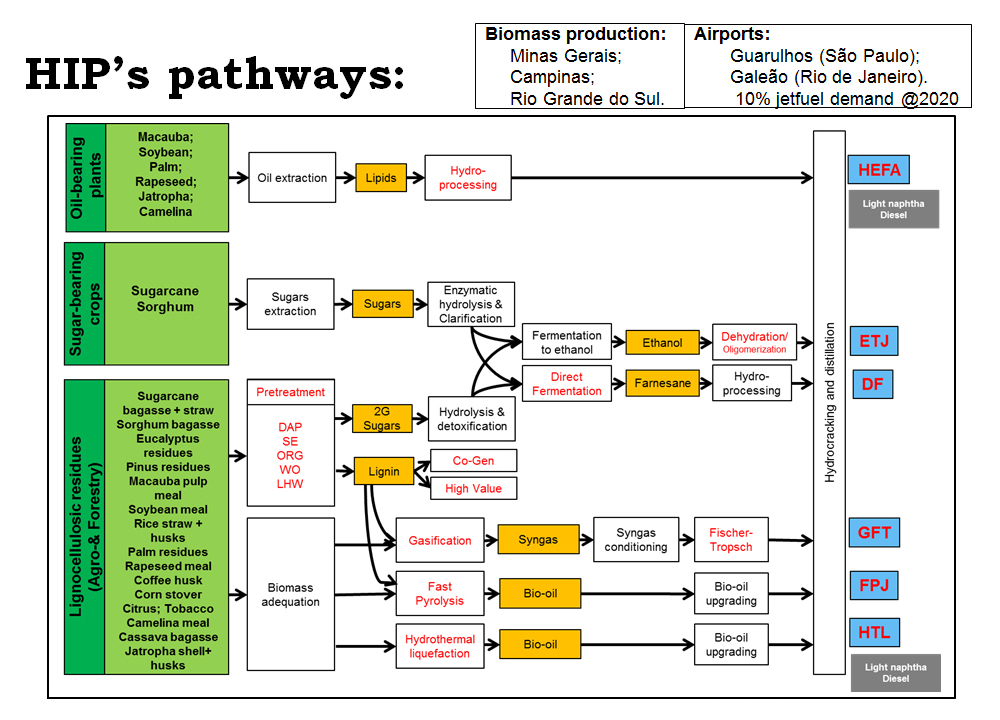Horizontal International Project (HIP)
for Biojet Fuel, Bioplastics and Marine Biofuel production in the Brazilian context.
Postdoc: Farahnaz Pashaei (Ongoing)
PhD candidate: Mar Palmeros (Ongoing)
PhD student: Zhizhen Wang (Ongoing)
HIP (2.2 M€) is a BE-Basic funded project that aims to preform full integral impact assessment (economic, environmental and social) of bio-based supply chains for regional biomass utilization to produce biojet fuel, bioplastics and marine biofuel in the Brazilian context. The project considers multiple combinations (>150 – see Figure) of key regional contexts (i.e. location, feedstocks, technologies, processing conditions and by-products) to identify the best local solutions based on integral sustainability performance indicators. The project also has a strong focus on the development of quantitative/qualitative methods/indicators to assess integral (environmental, social and economic) sustainability performance of the biobased supply chains. Results of the project are expected to be used to generate options for industrial piloting and demonstration, including solutions for improvements in crop management, wastes management, logistics, and targeted technologies.

Within the framework of HIP, six Individual Design Projects (IDPs) and a MSc thesis have been completed:
- “Integrating sustainable biomass feedstock and downstream conversion with focus on the case of Brazil” (by Antonia Mayer,
- “Technical feasibility of recycling nutrients from liquid waste streams from biorefinery system in Brazil” (by Ema Nemet,
- “Feasibility analysis of sustainable and affordable biofuels in the Brazilian Context” (by Nantia Bikaki,
- “Techno-Economic Assessment of Refining Technologies for aviation biofuels supply chains in Brazil” (Catarina Alves,
- “Integrated 1st and 2nd generation sugarcane bio refinery for jet fuel production in Brazil” (Catarina Santos,
- “Techno-Economic and Environmental Analysis of Oil Crop and Forestry Residues based Biorefineries for Biojet Fuel production in Brazil” (Constança Cornelio da Silva,
- “Future trends for biojet fuel production in São Paulo state (Brazil): An agent-based modelling and simulation approach to explore institutional barriers and opportunities” (Sebastiaan C.M. Fakkert, MSc.)
Furthermore, two PhDs and one postdoctoral research are in progress:
- “Towards a socially sustainable jet biofuel supply chain” (by Zhizhen Wang, PhD student): This PhD project aims to systematically evaluate social sustainability performance of biojet fuel supply chains to facilitate strategic policy planning to promote the development of jet biofuel production chains.
- “Sustainable Biorefineries” (by Mar Palmeros-Parada, PhD candidate): The project aims to develop an approach to support the incorporation of sustainability aspects in the design of biorefineries. The approach is grounded on a constructivist view of sustainability, contrary to predefined criteria-indicator approaches common in the design of biobased systems. Hence, sustainability is applied based on the views and values of those involved and affected by the biorefinery project itself, and in the particular context in which the biorefinery is (to be) implemented.
- “Integral sustainability assessment” (by dr. Farahnaz Pashaei, Postdoc): This project aims to perform multi-criteria analysis and single-score assessment for multiple economic, environmental, and social impact indicators of biojet fuel production in Brazil. This project combines quantitative (modelling and simulation) and qualitative (interviews, workshops and surveys with stakeholders and experts) research tools.